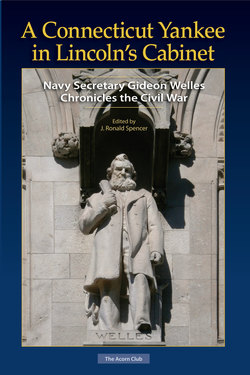Читать книгу A Connecticut Yankee in Lincoln’s Cabinet - Gideon Welles - Страница 8
На сайте Литреса книга снята с продажи.
ОглавлениеACKNOWLEDGMENTS
A Connecticut Yankee in Lincoln’s Cabinet is the thirty-seventh publication of the Acorn Club, which was founded in 1899 to publish books of enduring value in Connecticut history. The book is dedicated to the five former members of the Club who have died since the appearance of the Club’s last publication: Milton P. DeVane, Donald B. Engley, Ellsworth S. Grant, Edward W. Knappman, and Edward W. Sloan III.
A number of individuals – both Club members and non-members – were instrumental in moving this book from conception to publication. As the editor, I am pleased to acknowledge their contributions.
First, I am grateful to the five Club members who volunteered to serve on the publications committee for the book. Richard Buel, Jr., who edited or co-edited the last three Acorn Club volumes, made astute comments about an early draft. Briann Greenfield did a similarly thorough and constructive critique of the manuscript and offered thoughtful advice throughout the project. Richard Malley, the Club’s secretary, provided assistance with multiple matters, great and small. Patrick Pinnell not only reviewed the manuscript but took the excellent photograph of the statue of Welles at the State Capitol and worked with the book’s designer to incorporate it into the book’s cover. William Peterson recommended several important additions to the text and stood watch to prevent the editor, a landlubber, from making mistakes about maritime matters.
Several other Club members also helped make the book a reality. During a conference call of the Club’s executive committee in March 2013, Helen Higgins, the Club’s treasurer, asked a question that prompted me, on the spur of the moment, to propose a book based on Gideon Welles’s wartime diary. George Willauer, who stepped down as the Club’s president in May 2012 following six years of service, generously agreed to reassume the presidency on an interim basis so I, who had succeeded him, could concentrate on preparing this book. James English, a member of the Club for more than 30 years, was a source of encouragement from the project’s start, and his close reading of the manuscript caught many infelicities I had missed. Ann Smith cast her lawyerly eye over the publication and distribution agreement between the Club and the Wesleyan University Press. And Robert Smith, Jr. arranged for Jacqueline Pennino Scheib, a publications and copyright specialist at his law firm, to advise me on copyright issues and also to review the agreement with the Press.
Michael Lestz, chair of the history department at Trinity College, granted me permission to use departmental equipment to make scans of the 1911 edition of Welles’s diary; and Gigi St. Peter, the department’s administrative assistant, made sure I knew how to operate it. Jack Chatfield, my longtime friend and colleague in the department, reviewed the introduction. The book also benefitted from the attentions of Suzanna Tamminen, the director and editor-in-chief of the Wesleyan University Press, and David Wolfram, the book’s designer.
Finally, a special note of appreciation to two people who provided indispensable help from start to finish. Louis P. Masur, who became a valued friend during his nine years as a member of the Trinity College faculty and is now Distinguished Professor of American Studies and History at Rutgers University, confirmed my initial sense that the book was worth doing, critiqued the manuscript with care and discernment, and provided good counsel each of the many times I sought it. My wife, Linda S. Spencer, who was a National Register Specialist-Historian at the Connecticut State Historical Commission and its successor agency for nearly three decades, not only tolerated endless table talk about Welles’s diary but also read the manuscript at multiple points in its evolution and each time made recommendations that significantly improved it.
Thanks to all.
J. Ronald Spencer, Editor
November 1, 2013
